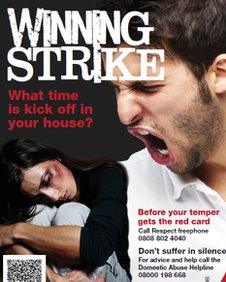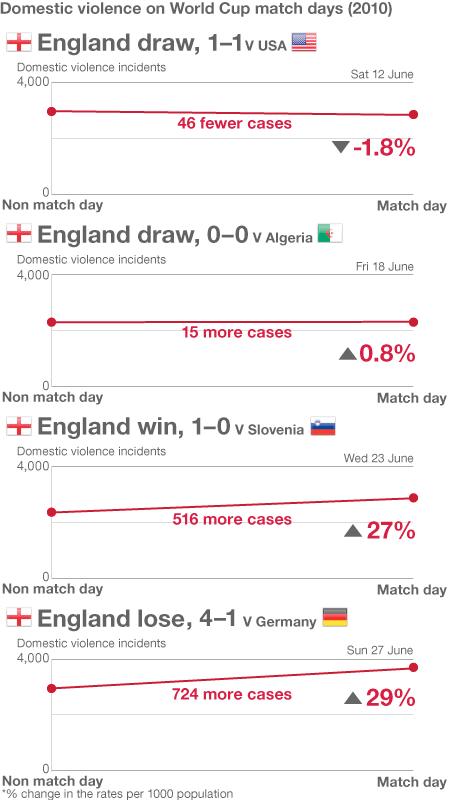Euro 2012: Tournament football and domestic violence
- Published

Police forces have launched campaigns to raise awareness
As England's Euro 2012 campaign kicks off, police forces across the country have issued warnings about domestic violence.
But what impact do international football tournaments have on this type of abuse?
Research by BBC News has found there was a surge in domestic violence reports to police during the 2010 World Cup.
Figures obtained from police forces across England under the Freedom of Information Act show that when England beat Slovenia, nationally the rate per 1,000 people of domestic violence reports increased by 27%.
And when England lost 4-1 to Germany, domestic violence increased by 29% - however on the two games in the tournament that they drew, there was no noticeable impact overall.
The percentages were worked out by comparing daily reports to police forces during the tournament with the corresponding days in 2009 when there were not any football matches happening.
Statistician Professor Allan Brimicombe, an expert in domestic violence and the chair of the Crime and Justice Statistics Network, analysed and verified the figures.
"There's a national pattern that is significantly relevant," he said, adding: "The stats are pretty conclusive. It's a definitive and significant increase."
Chris Hancox, from White Ribbon UK, which campaigns against violence to women, said: "If someone's football team loses, that's no reason to take it out on anyone, particularly the person they're supposed to love.
"There is no reason or rationale for it happening. It is only a football match."
'Power and control'
Paula Hall, a counsellor with Relate, said: "Football doesn't cause domestic abuse, but it's an issue which in some relationships can compound it."
She said arguments about the amount of television watched, alcohol intake, jealousy due to people spending more time with friends and an increase in money spent could lead to an increase in tensions.
Ms Hall added there could also be frustrations about the results, especially if one partner did not empathise.
Mark Brooks, chairman of Mankind, a charity which supports male victims of domestic abuse, agrees.
"The tension will be someone in a relationship is more focused on football. For example, the husband loves football and the wife doesn't and this can cause tension which is then exposed through domestic violence abuse."
Mr Brooks said it was not necessarily about people drinking more alcohol, as domestic abuse was multi-dimensional and a sober wife could beat a man.
Abuse can also be psychological and not always physical, he added.
"It's about power and control. For example, people can be forced not to watch it."
He added he was not surprised by the figures as the charity's helpline had also experienced an increase in calls.
However, domestic violence charity Refuge is keen to point out that abuse happens all year round, not just when England are playing in an international tournament.
The charity's chief executive, Sandra Horley, said: "Lots of men who abuse women have no interest in sport, and many football fans would never lay a finger on their partner.
"However, we do know that for some women matches can be one of a number of difficult times when their partners may abuse alcohol and use that as an excuse to be violent towards them."

The Association of Chief Police Officers (Acpo) has issued guidance for police forces on how to deal with any increase in domestic violence during Euro 2012.
It is urging forces to work with other agencies to remind victims of such abuse of the services available to them and to warn offenders of the destructive effects of domestic violence.
One force, Derbyshire Constabulary, has increased what it is doing following a significant rise in calls during the 2010 World Cup.
Det Insp Paul Carrington said the force was working closely with the city and county councils to raise awareness.
He said posters which offered advice had been produced and put in places including pubs, newsagents, GP surgeries, libraries and sport centres.
Officers who specialise in domestic violence will be on hand for all England and Poland matches, as Derbyshire has a significant Polish community. They will be able to offer guidance to officers at the scene so that they know what to look out for.
The police will also pay attention to people who are known to them to be either a victim or perpetrator. Curfews will be checked as will bail conditions.
"Anything we can do to prevent or intervene as early as possible we will do," Det Insp Carrington added.
Some charities are disappointed that the football community is not taking more action.
The Football Association said it could not comment on what was not a footballing matter, while the Football Supporters' Federation said domestic abuse was not one of its policy areas and it had to represent the views of its members.
White Ribbon's Mr Hancox, who has worked with football clubs including Bristol City and Bristol Rovers to raise awareness, said: "I'm surprised the FA has taken such a narrow approach.
"I would encourage the FA not to say it's nothing to do with us, but it should work with groups to get the message out.
"It would be useful if the FA would address this as they can get to clubs in a more efficient way."
- Published19 November 2011
- Published19 September 2011
- Published14 June 2010
- Published12 June 2010